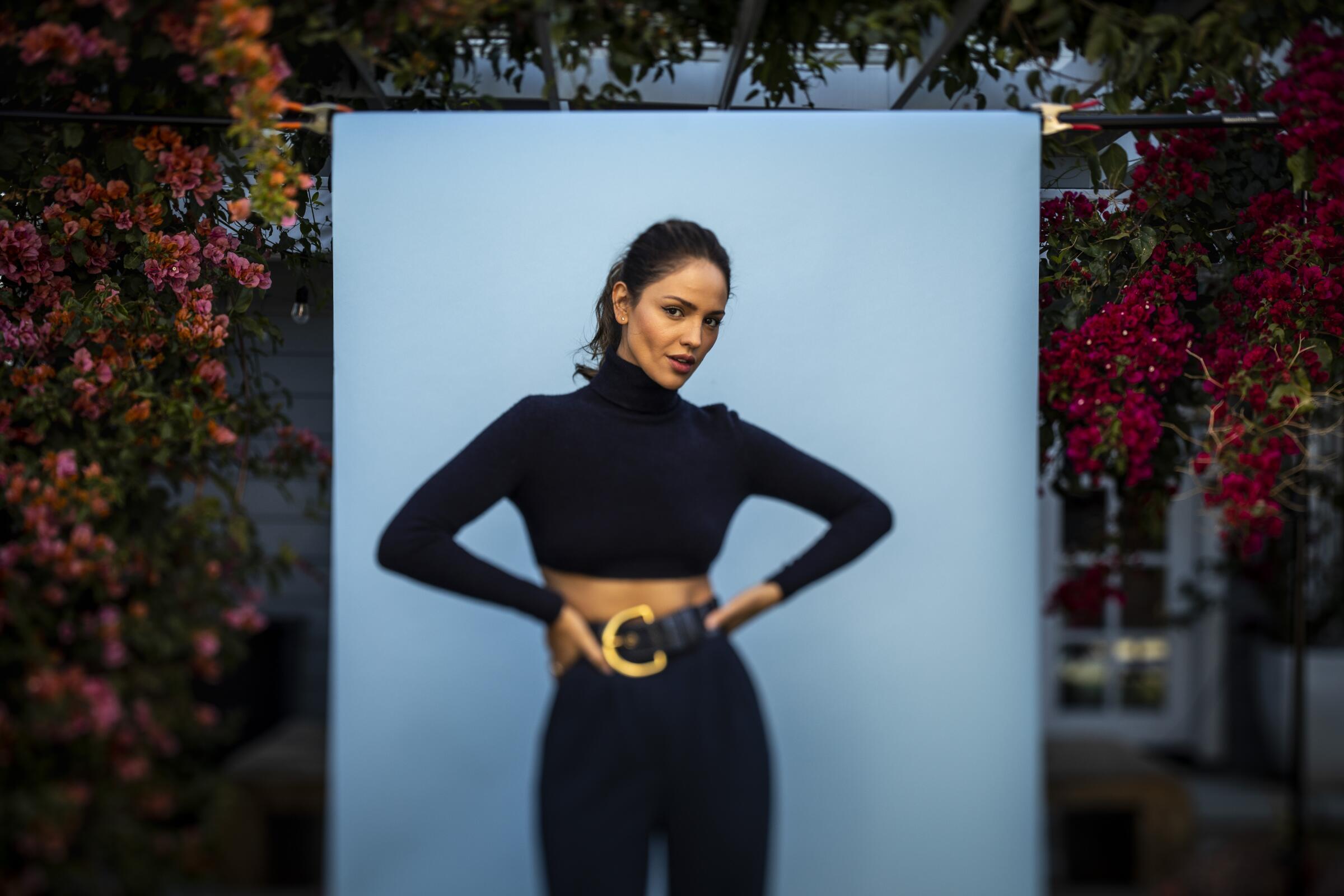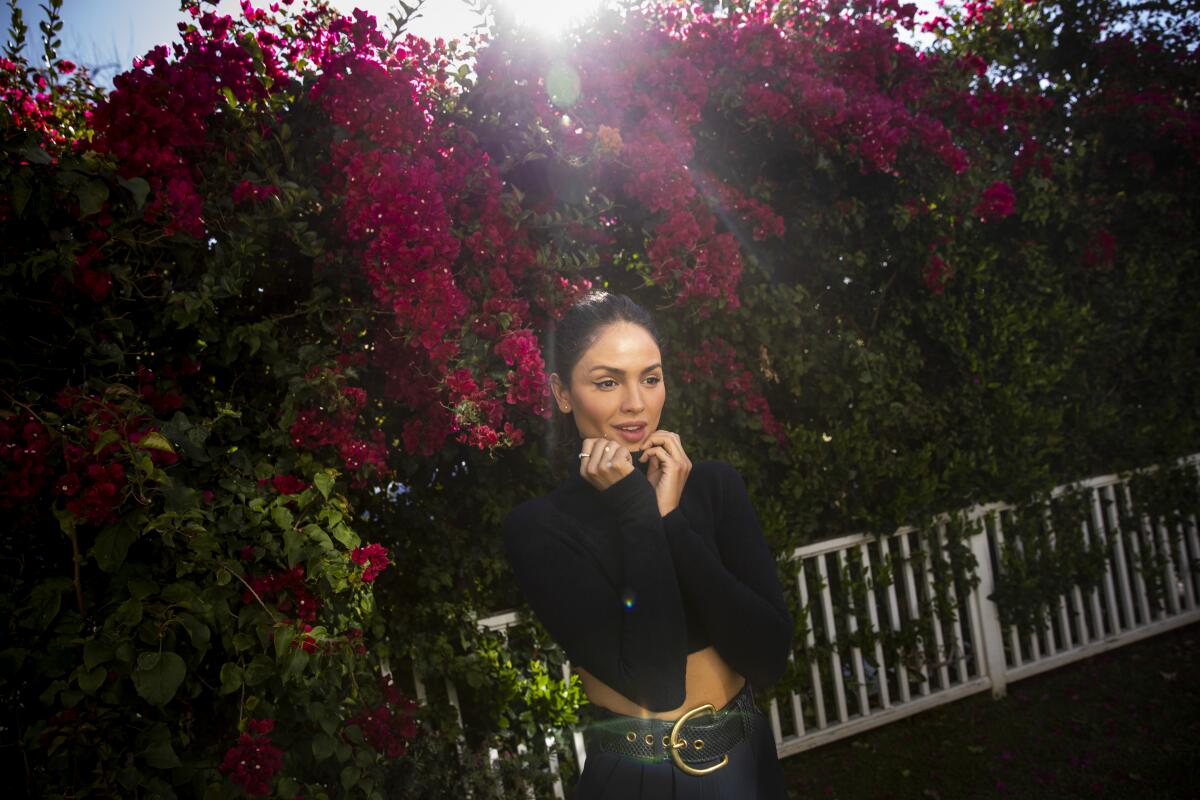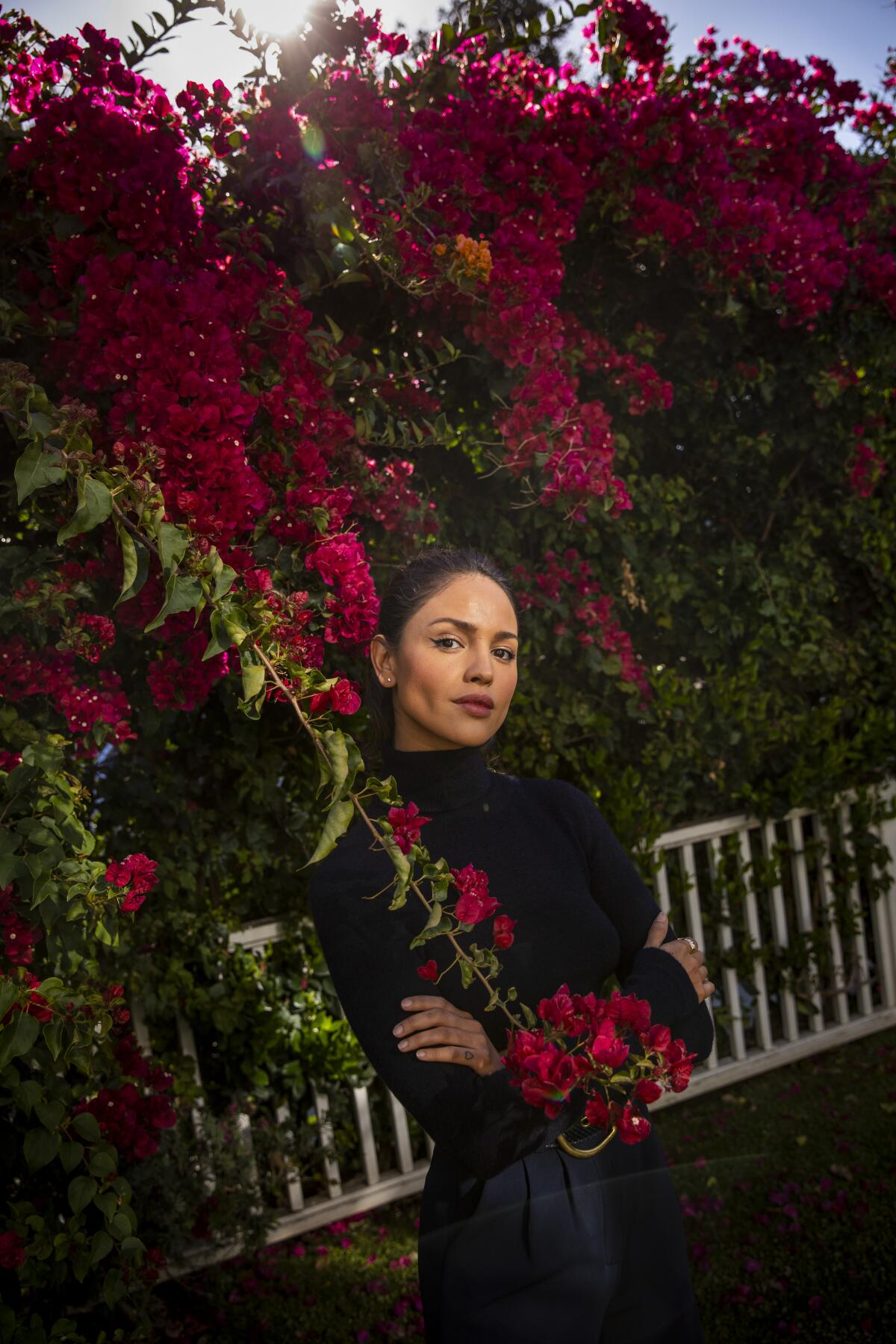Newsletter
Only good movies
Get the Indie Focus newsletter, Mark Olsen's weekly guide to the world of cinema.
You may occasionally receive promotional content from the Los Angeles Times.

One evening in London, where she was shooting scenes for the 2019 “Fast & Furious” spinoff “Hobbs & Shaw,” Eiza González couldn’t sleep. The culprit: a middle-of-the-night reckoning with the prospects of her professional future.
In the wee hours, an anxious González asked the universe and her mother, former model Glenda Reyna, “Is this the peak of my career? Am I not good enough? Is there not going to be anything else?”
At the time, González was landing insubstantial parts in Hollywood despite the fame she’d achieved as a young star in Mexico. Though she was often seen in tent-pole productions, her screen time was scarce. Even though she was vying industriously for more significant big-screen roles, she continued to fall short.
“I was almost there, but not getting them. I felt very self-conscious about my craft,” González, now 31, says by phone from her home in Los Angeles.
Always the pragmatic thinker, her mom — by her side since González’s turbulent adolescent stardom — put such crippling self-doubt into a big-picture, less fatalistic perspective.
“The way she approaches life, very directly and without sugarcoating, is something that has been so helpful throughout my career,” González says.
In the clarity of that nadir, González stepped back to acknowledge her expectations-defying trajectory and recalibrate. After all, her tenacity as a Latina in a cutthroat and uneven field merits huge commendation.
For the Mexico City native, with roots in the northern Mexican state of Sonora, music as a zealous aspiration came long before acting. Eight-year-old González, with an inherent aptitude for singing but also taking vocal lessons, dreamed of being a recording artist.
But her interests expanded drastically after the death of her father, Carlos González, when she was 12. Her mother, worried that the trauma would plunge her daughter into depression, enrolled the burgeoning performer into a slate of extracurricular courses, including musical theater. It took one class for González to redirect her focus.
“Shortly after, I talked my mother into letting me drop out of school. I don’t know how I did that,” she recalls. “I convinced her that I was positive acting was what I wanted to do for a living. It was so innocent of me, now that I truly think of it. “
After only a year fully engaged in the dramatic arts, González auditioned in the mid-2000s for the coveted show “Lola: Érase una vez,” from producer Pedro Damián — the man behind the youth-oriented melodrama “Rebelde,” which spawned the stratospherically popular musical group RBD. After a countrywide search, she landed the lead in the teen soap about a rock star, à la “Hannah Montana.”

“Overnight, I was catapulted into the public eye,” says González, who recorded two albums during her time on the show. “It was as big as it could get for Latin America at the time. I just don’t know how I did it. It was so intense. I was young and so not emotionally or mentally prepared for what that fame came with.”
Tabloids in her home country didn’t hold their sharp tongues when tracking, questioning and photographing her every move. González, then a fragile 15-year-old, took her first steps into womanhood under the judging gaze of millions while still mourning her father.
“I was psychologically and physically awkward,” she says. “You are not only trying to be a good role model, but you’re also defining who you are, who you want to be and making your own mistakes.”
Out of that rubble rose a steady career in music and television. González credits her mother with guiding her through those brutal yet formative years.
“She never changed around me. There’s no princess treatment toward me. That kept me really grounded,” she says. “In a world that felt like being in a pressure cooker, I had a mother who always let me vent about my feelings and my fears.”
Growing up in the Mexican capital in the 1990s, González couldn’t fathom ever working in American movies. There were few Latinas on-screen to point to as role models, even less so if thinking about an immigrant woman. Salma Hayek, who had crossed over and had attained certain recognition, was seen as the sole outlier.
“I never saw Hollywood as a real possibility,” González says. “For me, it seemed more like a dream than a reality.”
In her early 20s, between projects in Mexico, she would visit Los Angeles, not to work but to replenish her motivation. “Maybe one day,” she would think.
“It was merely a coincidence,” González says of her transition to the United States, born out of her mother’s “let’s just try it out” attitude. “She was like, ‘What about this thing called IMDbPro?’ And I was like, ‘Mother, it doesn’t work like that. You need an agent and management.’” But the conscientious parent signed her up anyway.
“Godzilla vs. Kong” director Adam Wingard and visual effects supervisor John “DJ” DesJardin on crafting the film’s “bombastic” kaiju battles.
Months later, González got a call out of the blue from Mary Vernieu, Robert Rodriguez’s casting director. The Mexican American filmmaker had auditioned more than 50 actresses for the terrifying character of Santánico Pandemonium in “From Dusk Till Dawn: The Series,” a role Hayek originated in the 1996 film on which the TV show was based, but hadn’t found the right fit.
“There were big shoes to fill,” Rodriguez says via email.
Vernieu had read an article about González and suggested her. After seeing her photo, Rodriguez had her read. Her audition tape stunned him.
“Eiza showed she had real authority as that character, and because of her musical background, she had fantastic stage presence,” he says. Even from that video shot against a white wall, he sensed her star power. González confirmed Rodriguez‘s intuition on set.
“What surprised me the most was how incredibly she performed through the monster makeup,” he says. “Once an actor is covered in full makeup prosthetics with contact lenses and fangs, that can easily zap the performance right out of anyone. But Eiza became superhuman and just owned it. It floored me. She gives an astonishing and ferocious performance through the makeup.”
“I love Robert because he is a true believer in people when there’s no hype,” González says of the director’s championing of Latino and Hispanic talent such as Hayek, Rosa Salazar, Jessica Alba and Antonio Banderas. “He supports his community in such a large scale. Sometimes we just need a chance.“
Later, when British director Edgar Wright called Rodriguez for a recommendation of a Latina actress to cast in “Baby Driver,” González was his suggestion. The action-packed love saga, in which she played the enchanting villainess Darling, was González’s international breakthrough. “She made us all proud,” Rodriguez says.
Beyond Rodriguez’s blessing, what sold Wright on González was the confidence in her audition, both solo and in a chemistry read with Jon Hamm. She emerged as the perfect person to play the femme fatale, able to handle the tonal cocktail of humorous charm and cold-blooded malicious intent.
“I was very impressed with her on the set,” Wright says in an email. “It can be a daunting prospect to share the screen with two Oscar-winning actors, but she was never outwardly intimidated. I have never asked her whether she was nervous to do the scenes; I want to preserve the memory of ice-cool Eiza totally holding her own.”
“Edgar had such a star-studded cast, and he could have cast anybody. No one knew who I was. But he believed in me and allowed me to give the character a personality and an identity,” González says. “When we made that movie, we knew it was an incredible script, but it was sort of an underdog. The boom it had was career-changing.”
“Baby Driver” wound up receiving three Academy Award nominations in 2018. As a result, González was asked to present at that year’s Oscars. She remembers attending with her mother and sitting next to Helen Mirren. “I’m still that little Mexican rascal that grew up in Coyoacán [in Mexico City]. Never in my wildest dreams was this a possibility,” she says. “I cried the day I found out I was going to present. I couldn’t believe it.”
After that visibility boost, opportunities for more layered supporting roles followed: Robert Zemeckis’ “Welcome to Marwen,” Alice Waddington’s dystopian indie “Paradise Hills,” opposite Vin Diesel in “Bloodshot” and a second collaboration with Rodriguez in “Alita: Battle Angel.” But even as her credits grew in size and prestige, getting cast didn’t get simpler.
“I always say to my agent, ‘We don’t audition for stuff. We fight for stuff.’ Besides my first show with Robert, I don’t think I’ve ever booked something easily,” she says. “It’s never been like I go in a room, I audition and I get it. There’s always a lot of extra convincing to do.”
González is conscious that she’s gotten better as an actress and that not every rejection stems from discrimination or biases. “Sometimes you are not right for the role or you weren’t that good on an audition. I like to be objective,” she says. But she’s also aware of the built-in disadvantages for Latinos in general, and for Latinas even more.
“Let’s say you are giving the role to someone based on their work. Well, if you are comparing me to a white woman who has had the chance to be in a ton of movies with bigger roles, then I’m already at a disadvantage because I haven’t gotten those opportunities to show what I’ve got. Doesn’t mean I don’t have it,” says González.
“Moving to this country has been challenging, because there are so many things that are against you as an immigrant woman that have zero correlation to your talent. A lot of predisposed ideas are projected onto you. It’s fighting a lot of concepts versus just going into the room and knowing that you are going to be seen for you.”
During her early days in Hollywood, González struggled with an overly self-effacing mentality. She’d think: “I should be thankful and not ask for more. This is good enough for me.” Often, the actress would joke about being willing to play a tree in the background if it meant learning from a respected director. That’s changed.
“I’m learning that it’s OK to want to take up more space,” she says. “Women are taught not to take up space, but now I’m like, ‘I can be a leading lady. I have the talent. Let me show you that I am capable of doing this.’ It’s OK to be driven, and I shouldn’t feel like I’m asking too much.”
Now about the same age as Hayek was when she produced and starred in “Frida,” González is more than ever looking up to the Oscar-nominated actress. Both stars began their U.S. path in the same role under the same director; now, González wishes to follow her self-determinist example. She wants to be part of the creative space — to produce and, finally, be the leading lady.
“I have so much respect for Salma,” González says. “She did it in a time when there wasn’t a consciousness about these issues. I’m in the same stage, trying to make my own stuff, because I have realized that if I allow myself to be at the mercy of the industry, I will never achieve the things that I want to. I’ve also learned that it’s OK to want better things for myself.”
Godzilla! Kong! Fight! The kaiju showdown restores some of the giddy escapism that’s been missing from the big screen lately.
Part of that transition, more than just avoiding offers in stereotypical parts, means securing jobs that are not solely tied to her background and that don’t use her to fill a diversity quota. Her recent J Blakeson-directed film on Netflix, “I Care a Lot,” in which she stars opposite Rosamund Pike, illustrates that evolution. In the story about a duo that scams the elderly, González plays Fran, the astute partner in life and crime to Pike’s unscrupulous Marla.
“I love directors who take chances like J Blake did with me on ‘I Care a Lot,’” she says. “That role didn’t have a specific ethnicity. He could have cast literally anyone and yet he went with a wild choice.”
“I immediately saw that she had a really wide range,” says Blakeson, who was familiar with González’s work in “Baby Driver.” “She could deliver the strength and capability of Fran but was also brilliant at the more emotional stuff. A mixture of fight and fragility that was perfect for the role.”
For González, constantly having to justify her value as an artist, as a woman who’s a Latina, is disheartening.
“We live in a society that inherently likes to minimize women. If a woman has desire for success, she is desperate, but if a man has desire for success, he is driven. There are all these negative things tied to a woman wanting to succeed,” she says. “People have suggested my success has been tied to my romantic relationships or the people I’m friends with.”
Recently, while doing press for “Godzilla vs. Kong” with costar and fellow Mexican thespian Demián Bichir, she was moved to hear him speak out against insinuations that her commitment and skill aren’t the reasons she has soared so high.
To that, Bichir responds, “If you think she is just here because she is pretty or because of this or that, that’s not the case. It takes a lot of work. Do you know the amount of beautiful people there are and the amount of people who have talent? Millions. It takes so much more than just that.” Hearing that from someone like Bichir, who shares a similar journey into the American entertainment landscape, carried added significance for her.

González thinks of herself as two people. There’s the confident Eiza who walks into rooms and is all about the work. Who intensely preps for roles or tries to improve her English, which is already mostly unaccented (but with a unique cadence she likes), thanks to her father prodding her to learn languages. Then there’s the Eiza who wonders, “How am I here?”
“I am terrified when I go to set, because I’m still disposing myself of all these expectations from when I was 14, when I was expected to be perfect, to be the best singer and the best actress,” she says. “I’m still shedding that skin off of me.”
Now, while she still has high expectations for herself, she’s found a healthy balance that’s allowed her to maintain her passion for acting as she navigates the ebbs and flows of the business.
“Sometimes you do nail it and sometimes you don’t. I’ve nailed some of my performances, and in some, I’ve been awful. That’s OK,” she says, “but at least I was taking risks. As soon as I normalized that failing is part of growth, it freed me as an actress. I started having more fun.”
Whenever González, who will next be heard voicing the character of Milagro Navarro in the animated feature “Spirit Untamed” and seen in Michael Bay’s “Ambulance” alongside Jake Gyllenhaal, feels dejected about not booking a desired project, like that night in London, she tries to think about the greater effect of every shot she takes, aiming higher each time.
“I have to do it in order for other people to grow up and feel like they are being seen. That’s where I grab my strength and move forward,” she says spiritedly.
Speaking about her collaborations with cinema’s titans, González often repeats, “They could have cast anybody.” But in the end, they selected her to enliven their characters. The truth is, those parts weren’t meant for anybody but her.
Only good movies
Get the Indie Focus newsletter, Mark Olsen's weekly guide to the world of cinema.
You may occasionally receive promotional content from the Los Angeles Times.